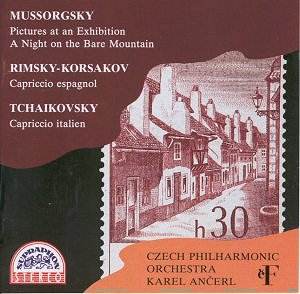Ančerl's tenure with
the Czech PO began in 1950, succeeding Talich. In the following eighteen
years, which ended with the Russian occupation and his flight to Toronto,
Ančerl (1908-1973) recorded extensively for the state record company,
Supraphon, reaching the height of activity during the 1960s. Those LPs
carried his name far and wide within the then Warsaw Pact brotherhood
and across the Western world. This vinyl diaspora prepared the ground
for his Canadian late summer and a handful of recordings with CBC. At
the same time it provided an opportunity for various Western critics
to sneer at poor translations and misprints in the sleeve-notes. This
easy sport distracted attention from some riotously inventive and whipcrack
performances. I hope we are beyond that now and can focus on the performances
and the music.
The very analogue tapes that fuelled the Czech LP explosion
of the 'sixties have been systematically transferred onto CD by Supraphon.
This is one example.
Conductor and orchestra were at their gritty and snappy
best in the music of the early part of the last century and the late
nineteenth century. Strengths are well to the fore in the unhurried
but metronomically emphatic Baba Yaga of Pictures. The
weaker link comes with the brass playing, especially the trumpet which
sounds splintery. The woodwind have a distinctive Gallic warble; the
horns likewise: listen to them in The Old Castle.
With these perfectly listenable recordings you must
not expect perfection. They lack the aural amplitude we take for granted
in more modern recordings and you will notice this when you come to
The Great Gate of Kiev which Ančerl
paces and grades with enviable freshness. The recordings are in no sense
primitive but radiate a raw and slightly bitter vividness.
That rawness also races through that other collaborative
effort: Night on the Bare Mountain. Aggression, deliberation
and precision characterise this recording. The woodwind are distinctive:
chuckling, vinegary, liquid. If you know Talich's leering and chuckling
flutes and clarinets in his Suk Asrael Symphony you will know
what to expect. The two Caprices make acceptable fillers evincing the
same qualities as the Mussorgsky works. The string playing in the Tchaikovsky
warhorse is spellbinding and showing more savour than the Rozhdestvensky
(Brilliant Classics) recently reviewed here.
Russian warhorses from the Czech Phil
and Ančerl during their heyday. Not a first choice in audio terms
but anything but bland.
Rob Barnett
